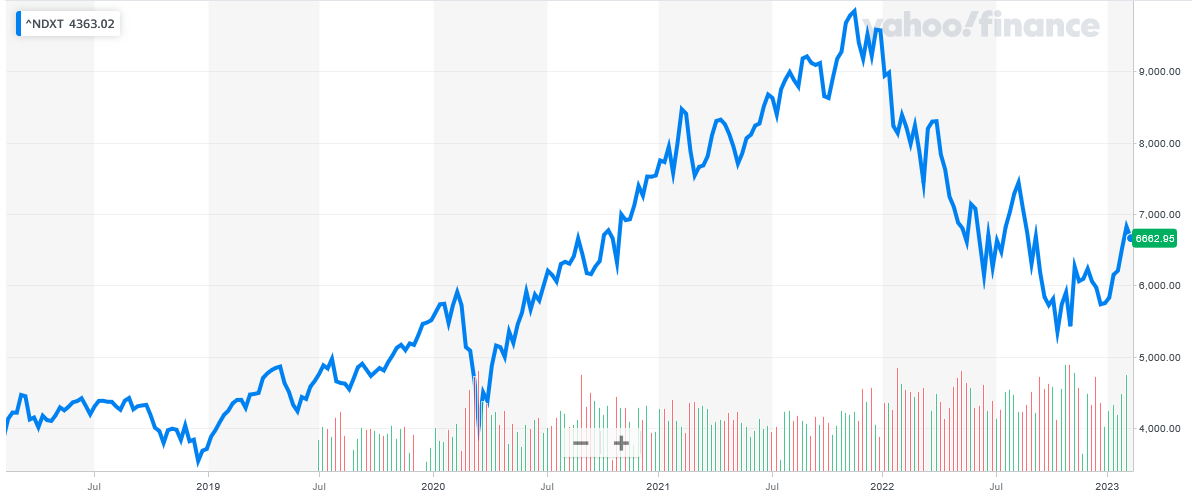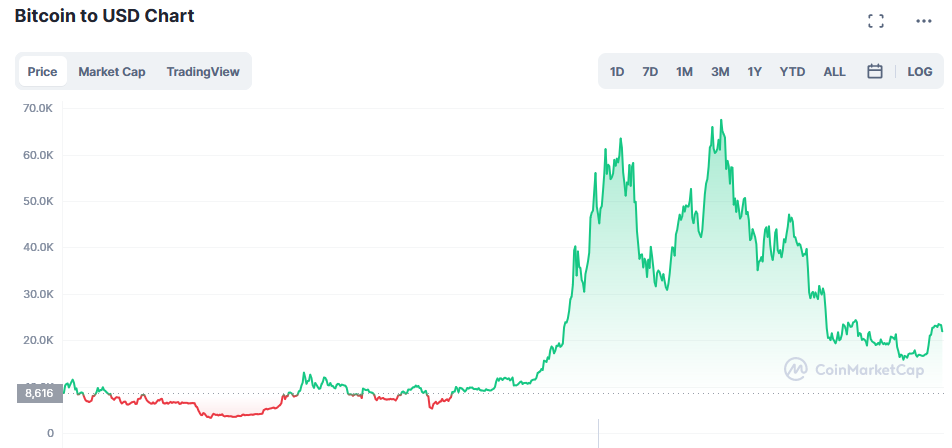
Summary: I talk about the mental game of investing, particularly as it applies to crypto markets. Subscribe here and follow me to get weekly updates.
Dear Family:
If you’re receiving this letter, it’s because you asked me to buy bitcoin for you back in 2014.
First off, the good news: that $1,000 of bitcoin is now worth $26,803. It’s one of the greatest investments you’ve made: a 2,500% increase in less than 10 years.
(Compare that with the overall stock market, which has increased 113% in the same period.)
I’m writing to give you an update on your investment, a little bit like Warren Buffett’s Annual Shareholder Letters, but just for you … and 50,000 of my close personal friends.
Why Did Bitcoin Go Up?
All the bitcoin in the world is worth about $420 billion today. Why?
I don’t know.
In the beginning, bitcoin was intended as a kind of digital money (that’s where we get the word “cryptocurrency”).
That has clearly not worked out: although a few weirdos use it to pay for things, bitcoin has not caught on in the same way as, say, Venmo.
Next, we all believed bitcoin was a kind of “digital gold.” Since bitcoin, by design, will only have 21 million ever “mined,” with the last one mined around 2140, it will become more valuable as it becomes more scarce.
Well, maybe.
We won’t be alive to see that day, unless our heads can be frozen and attached to robot bodies. Possibly we could pay for that procedure with our bitcoin – but again, the cryo labs probably won’t accept it as payment.
Another theory is that bitcoin is non-state-controlled money, which is useful in countries where the national currency becomes worthless, due to government overspending or corruption. (The recent debate about our debt ceiling leads some to question whether the U.S. dollar might suffer the same fate.)
Again, however, bitcoin is not useful as an alternative currency when the price can swing 50% over the course of a few months: that’s just as bad as the government money you’re trying to replace.
So, why does the price of bitcoin go up? The short answer: no one knows.
I have concluded that bitcoin is more like a technology stock than anything else. Here’s a comparison of technology stocks versus the price of bitcoin over the last 5 years:


They’re not identical, but you can see similar peaks of investor excitement. Bitcoin is a technology, and investors think about it like a technology company.
“Hold on,” you say, “bitcoin is not a company. There’s no revenue! No employees! It’s not like buying Apple or Tesla stock, which have real buildings with real people trapped inside.”
True! But there are “revenues” (the transaction fees paid to the miners who run the bitcoin network) and “employees” (the team that develops and maintains the bitcoin network): both earnings and expenses.
“Sure,” you respond (I’m putting a lot of words in your mouth), “but State Farm sells insurance. ExxonMobil sells gasoline. Toyota sells cars. What does bitcoin actually sell?”
Um … a dream?
The Dream of Bitcoin
Today, of course, there are thousands of digital assets besides bitcoin (these are also called “cryptos” or “crypto assets”; I will use the terms interchangeably).
All these crypto assets are created on the same premise: transferring some unit over value over the internet. Together, these assets are currently worth a lot of value: over $1 trillion.
Bitcoin remains the OG, the granddaddy of this thriving ecosystem. It’s the original dream that’s now becoming a financial reality.
Even if these crypto assets are not replacing money, they’re certainly supplementing money. The regular economy and the digital economy are becoming more and more intertwined.
So bitcoin’s dream – a financial system not controlled by any single government – is coming true. Just not with bitcoin.
This is common in technology revolutions: early believers think it will go one way, but it turns into something else entirely. (Amazon used to be a bookstore.)
Hardline “bitcoiners” believed there was room for one, and only one, digital currency. Bitcoin, they thought, would take over the world.
But of course, the world can operate with many different types of money: dollars, Euros, pesos, and so on. Not to mention many types of “stored money” like frequent flyer miles, Visa gift cards, gold, and the like.
In the crypto economy, everyone is replicating these types of value, online — and creating new ones, as well.
We’re extending the existing financial system onto these new digital technologies.
Read that sentence again. We’re not replacing the economy, like the bitcoiners thought. We’re extending it.
So, the hardcore bitcoiners are wrong. This is obvious: no one is seriously using bitcoin as payment.
But the hardcore crypto skeptics are also wrong. This is also obvious: when the government is discussing how to regulate digital assets, they’re here to stay.
The dream of bitcoin is coming true, just not in the way that anyone originally thought. It’s not bitcoin, it’s everything that bitcoin inspired.
So, back to the original question: why does bitcoin continue to have value? For this, we’ll need to go back about 400 years.

The Dutch East India Company
The first joint-stock corporation was started in the Netherlands in the early 1600s, when the Dutch East India Company received a government-sanctioned monopoly on the growing spice trade between Europe and Asia. This sweet deal got even sweeter: ordinary investors could buy shares in the company.
The Dutch East India Company was wildly profitable for many years to come, greatly enriching its shareholders, but it was the idea of a publicly-traded stock that was the real innovation.
Companies, owned by the people.
By the 1700s, the market for these public stocks was so great that a stock exchange was set up in New York, and the rest is history.
Similarly, it may be that the idea of bitcoin – i.e., the new digital financial system it represents – will be bitcoin’s lasting legacy, more than bitcoin itself.
Cryptos, owned by the people.
In summary, bitcoin has not fulfilled its promise of digital money. The idea of bitcoin (digital money, digital finance, owned by the people) has become more important than bitcoin itself.
So, should you sell your bitcoin?
It is, of course, yours to do with as you please. I can make no claims about the future price of bitcoin (and please ignore those who do).
But I’m holding onto mine for now, because there is still hope that bitcoin may become more useful in other ways, which could fuel the next wave of growth.
Also, bitcoin is still the way that most people get involved with crypto in the first place. It’s the most widely recognized. It’s got the most support. It’s got a first-mover advantage.
However, if you’re looking for new investment opportunities, I think there are better options than bitcoin.
The New Crypto “Companies”
Just as the Dutch East India Company spawned a wave of new public companies that changed the financial system forever, these new crypto “companies” are evolving our current financial system.
Ethereum (ETH) is the most exciting project, because it not only allows for new financial applications to be built on top of it, but it is led by a strong team of developers who are constantly upgrading and improving it. I expect the total value of Ethereum to eventually surpass that of bitcoin (as that date gets closer, I’ll be gradually flipping my holdings).
Uniswap (UNI) is another terrific “company,” because it solves a real-world problem: it lets investors trade one crypto asset for another, like exchanging currencies. The design is elegant, the team is constantly innovating, and the product actually works.
Binance Chain (BNB) is the digital asset started by Binance, the largest digital exchange in the world. Since Binance is not publicly traded, owning BNB is a bit like owning stock in the company. At the same time, like Ethereum, it can be used as a platform to build new financial applications. Like Binance, BNB seems well-managed with a potentially dazzling future.
OpenSea is the largest NFT platform: you can think of it like an early eBay for digital goods. Unfortunately OpenSea is not a publicly-traded company, though you can buy shares through secondary markets if you meet certain criteria. I’m sure there will be some kind of public offering: this company is going to be a powerhouse.
Finally, Coinbase (COIN) is the largest U.S. digital exchange, the gold standard for a new kind of “bitcoin bank.” It’s fully-regulated, meaning it’s the rare crypto company that works within the U.S. banking system, which means its stock is publicly traded (no crypto needed).
I’m a big believer in the long-term growth prospects of these companies and cryptos … with one important caveat.

Crypto is Still Risky
Remember: I’m not a financial adviser, just a guy who writes and speaks about these technologies to a global audience.
But your financial adviser and I probably agree on one thing: crypto is still highly risky, so invest only a small amount (no more than 10% of your overall portfolio), and be willing to lose it all.
To me, the biggest risk to crypto investments is the possibility that the government might shut them down. It seems unlikely they will be made illegal, but the government could restrict them through excessive taxation or cutting off access to their banking services.
However, the genie is out of the bottle. It’s unlikely that he’s going back in.
Bitcoin invented a new way of doing money. And although bitcoin has not become world-changing money, it has changed the financial system. We’re still in the very early days of that change (remember, the Dutch East India Company lasted for over 150 years).
Crypto is the extension of our existing financial system. Money is going from paper to digital. Just like email. Just like contracts. Just like everything.
This presents enormous opportunities for those of us who are willing to put our money where our mouth is: to invest for the long term in these new digital assets.
I’m holding. Are you?
50,000 crypto investors get this column every Friday. Click here to subscribe and join the tribe.

